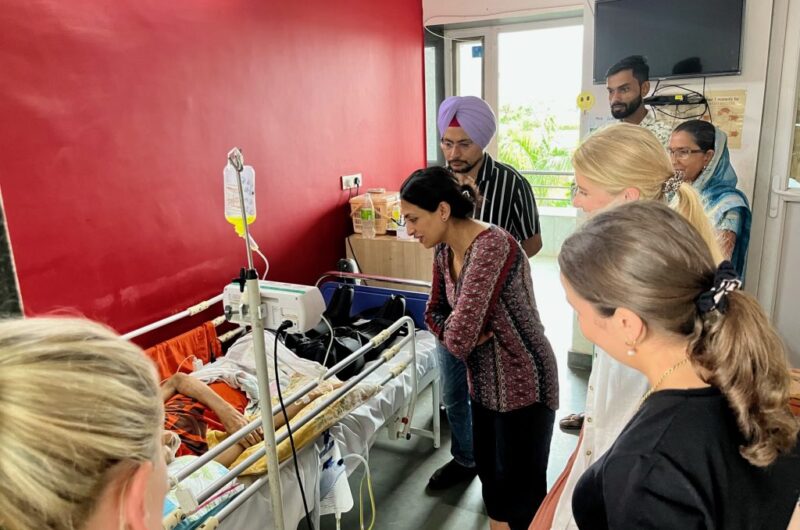By Munish Datta
In July a multidisciplinary team of Cambridge University Hospitals allied health professionals (AHPs) joined with UK-based charity Rama Foundation and its Indian partner organisations on a project to jointly develop treatment protocols, improve knowledge exchange and share best practice, and support the organisations providing outreach care for communities in need in India.
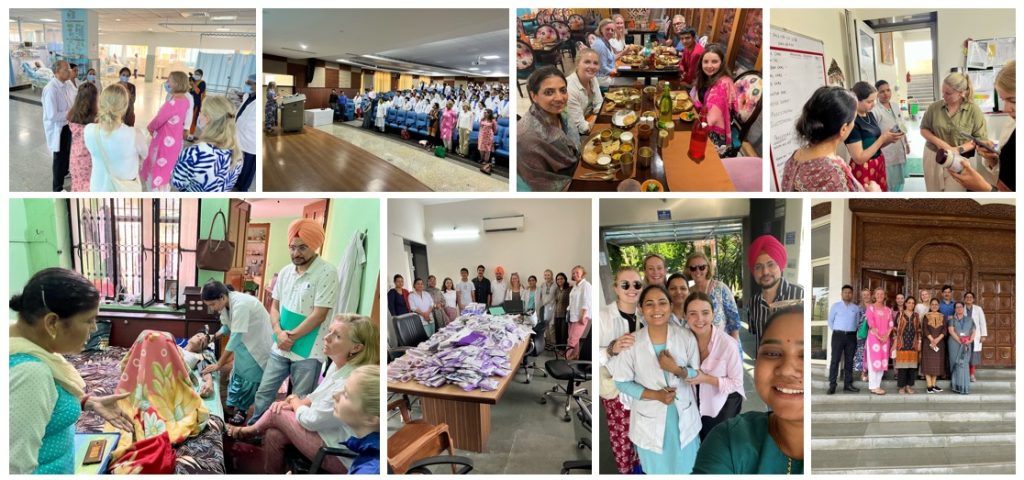
The CUH team of three dietitians (Artika Datta, Rachael Mullan and Paula McCusker), physiotherapist Lucy Hughes Stanton and Dr Helen Watson, Director of Allied Health Professionals (AHP) visited Rishikesh and Dehradun in the foothills of the Himalayas in north-east India. As Rama Foundation treasurer and trustee Munish Datta explains in this blog, the visit was part of an ongoing collaboration to support the delivery of care by allied health professionals, in particular the development of palliative care facilities in India.
Background
Nutritional care plays a fundamental role in palliative care medicine, especially for oncology (cancer) patients. Dietetic support is essential in providing personalised nutritional plans that improve patient care, clinical and functional status, and quality of life. In India, nutritional and palliative care, and broader allied health professions (APH) services are underdeveloped.
Over 15 years, dietitians at CUH have collaborated with Rama Foundation (RF), a UK registered charity with a mission to build the capacity and skills of socially and economically unserved communities in India. RF have successfully coordinated many projects focused on improving nutritional intake and enhancing nutritional care, while working closely with local partners in India in the areas of education and nutrition.
Guided by recommendations from CUH staff, several supportive initiatives have been launched. For example, fortifying the diets of up to 300 children in schools in Rishikesh with a daily glass of milk and providing food parcels for families of cancer patients from disadvantaged backgrounds.
The visit
July’s intensive, eight-day visit was co-developed and co-delivered by RF, CUH healthcare staff and RF partners in India with three clear objectives in mind:
1. Complete AHP assessments and support local clinicians in home visits for palliative patients from disadvantaged backgrounds.
2. Help build local clinical capacity to provide AHP education to the clinical staff at Rama’s partner organisations so they can better support patients and carers from unserved communities.
3. Plan how support can be continued remotely from the UK, for example remote teaching and learning exchange through a series of webinars.
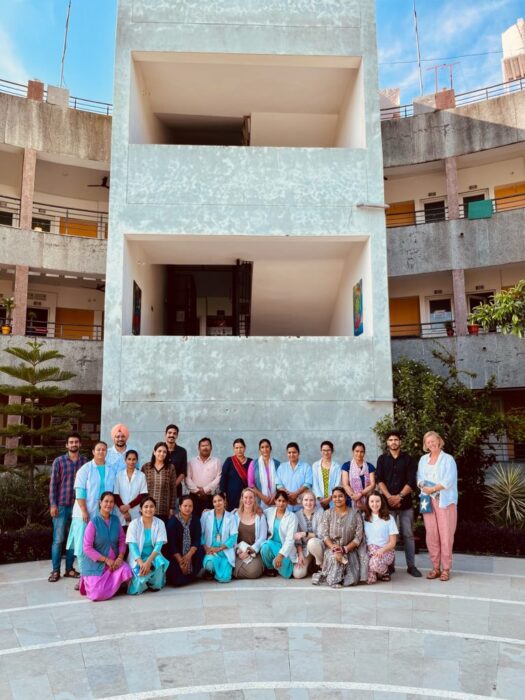
The team of six CUH staff members raised their own funds to cover expenses, with additional support from CGHP and Nutricia towards travel costs. They also collected and brought with them more than 100kgs of nutritional supplements and IT equipment from the UK.
What did the team do during the visit?
The visit started at the Hospital & Institute of Integrated Medical Sciences (HIIMS) where the UK volunteer team had the opportunity to exchange knowledge and experiences with local medical professionals and students. The CUH team also gave talks to local medical staff on a range of topics including nutrition in head and neck cancer, spinal cord injuries and their rehabilitation, and the role of allied health professionals.
The team was able to observe specialist medical teams, doctors and AHPs in ICU and inpatient units and the nursing team at the HIIMS. An ongoing sharing of best practice and exploration of scope of collaboration for cancer care was completed. It was a hugely successful visit and start to the partnership with a hospital that is doing amazing work to provide better care for underprivileged members of society.
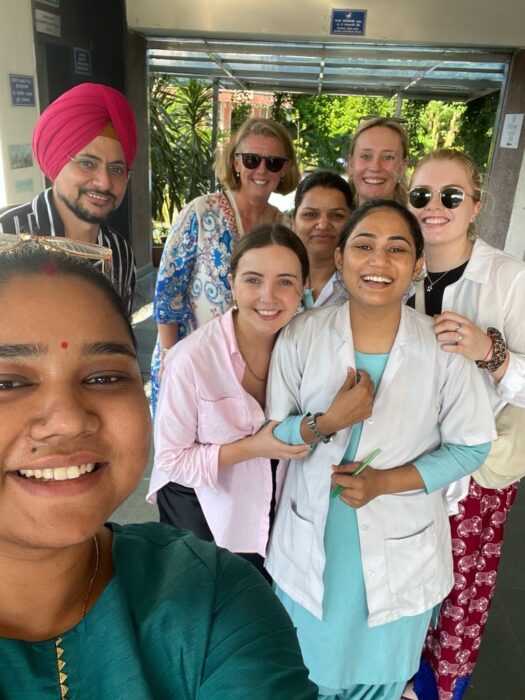
The team also spent four days with long-standing RF partner Ganga Prem Hospice (GPH) which provides critical palliative and spiritual care to patients from vulnerable and disadvantaged backgrounds. This included supporting medical and nursing teams in caring for patients at the 15-bed facility, assisting the homecare team visiting patients in the community, and delivering practical learning sessions for the local GPH teams. Physiotherapist Lucy Hughes-Stanton completed hands-on moving and handling training, and the dietitians completed training on nutrition support in the palliative care setting.
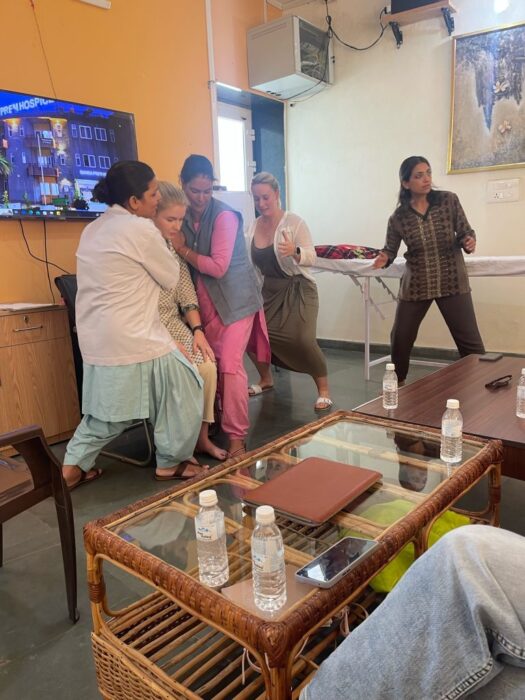
Lucy Hughes-Stanton, Physiotherapist, Cambridge University Hospitals
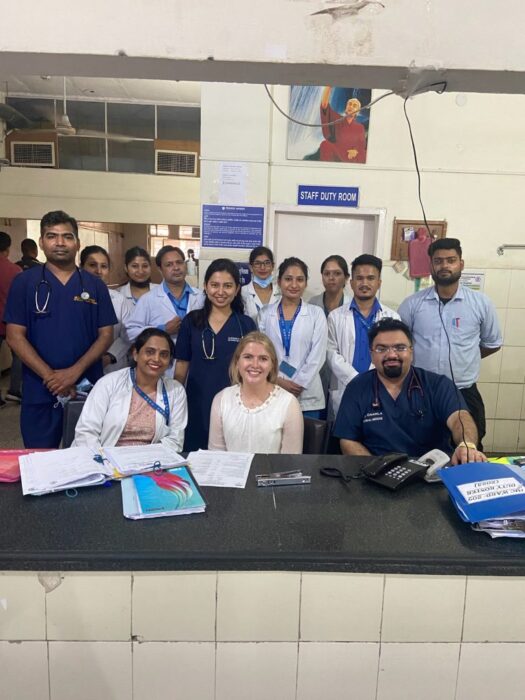
Paula McCusker (centre), Specialist Hepatology Dietitian, Cambridge University Hospitals
What impact did the work have?
The crucial role of allied health professionals in providing holistic and personalised patient care is well recognised in the UK. However, despite a huge demand for their services in India, this sector is underdeveloped and highly fragmented. Although many people train as allied healthcare professionals, there is a lack of standardisation of the courses and no uniformity in the outcome of such professionals (Rawekar A et. al 2020).
Currently there are no AHPs at the Ganga Prem Hospice and only two dietitians and nine qualified physiotherapists in the 1000-bed HIIMS. We hope that by bringing our experience we can help bridge that gap, by training the staff to give advice appropriately and help improve patient care. By supporting clinicians in their assessments of patients and listening to the needs of individuals and families, the dietitians provided advice, guidance, and oral nutritional supplements to people who would not otherwise receive this.
The team received very positive feedback from both the hospital and GPH. HIIMS are keen to implement the overall recommendation from the visit to set up an AHP function and introduce formal dietetic qualifications. Staff at GPH found the teaching sessions very helpful, particularly the sessions on moving and handling.
During the visit, with the support of local professionals, the team was able to support around 30 patients and by doing so convinced HIIMS and GPH about the value of APH provision. We have now started the process of defining how such a provision can be created locally. This exchange of knowledge has been invaluable to the Indian partners in terms of value definition and scoping.
“Thanks for your visit to our Institution. It was a great honour to receive all of you. Your trip made a great beginning for collaboration, which certainly would grow with time, and likely impact lives of millions of people in the region.”
Dr Sunil Saini, Director, Cancer Research Institute, HIMS.
What was a highlight of the visit?
The team members thoroughly enjoyed the visit and have returned with fond memories. One unforgettable experience was the trip to visit Divya Prem Sewa Mission (DPSM) School, a long-standing partner of Rama Foundation. The team had planned to donate chocolates as a special treat and some iPads for better education access. To travel to the school, you must cross the River Ganga but because of the monsoon rains, the river was flowing quite rapidly and the car got stuck into the middle of the river. Fortunately, there were no major disasters, and the team was safely supported by local people and the donations of chocolates and iPads reached the school undamaged.
What has the team learnt from the experience?
Working in a very different culture and medical system, with colleagues who may not be fluent English speakers, and serving patients from very disadvantaged backgrounds has developed the team’s resilience, agility, and ability to work collectively as part of a multi-disciplinary team.
They’ve developed their organisational skills in the process of carefully planning the trip, they’ve been exposed to different types of patients and situations they don’t encounter in the UK, and their immersion in a different culture and way of thinking will enhance their ability to work successful with diverse colleagues and patients at CUH.
Read about the team members’ experiences in their own words.
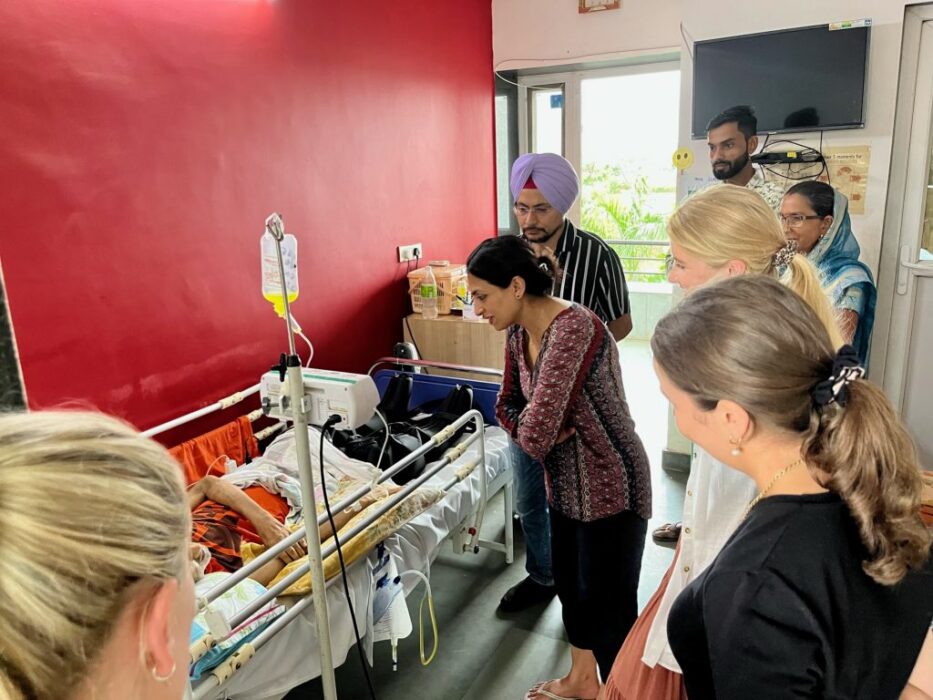
Artika Datta, Trustee Rama Foundation, Advanced Specialist Dietitian
What’s next?
• Support HIIMS to design an AHP function in the Cancer Research Institute and ICU, set up a formal dietetic qualification and consider development for dietitians and physiotherapists.
• Jointly develop treatment protocols and guidance for patients and support the continued development of clinical care through sharing of best practice.
• Investigate the potential for medical electives, exchange visits, and other opportunities to link up and share knowledge.
• Investigate funding options for nutritional supplements and reciprocal visits.
Return to blogs

